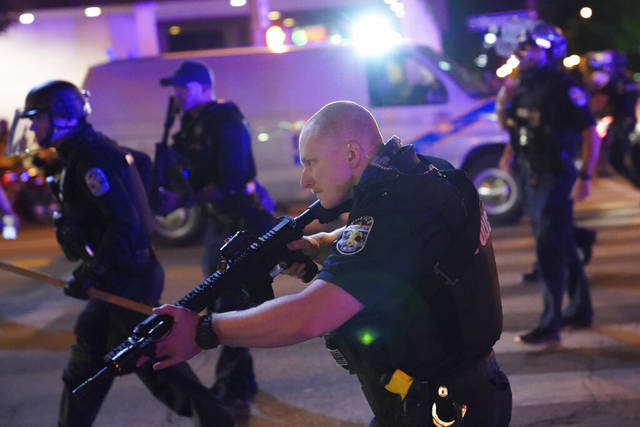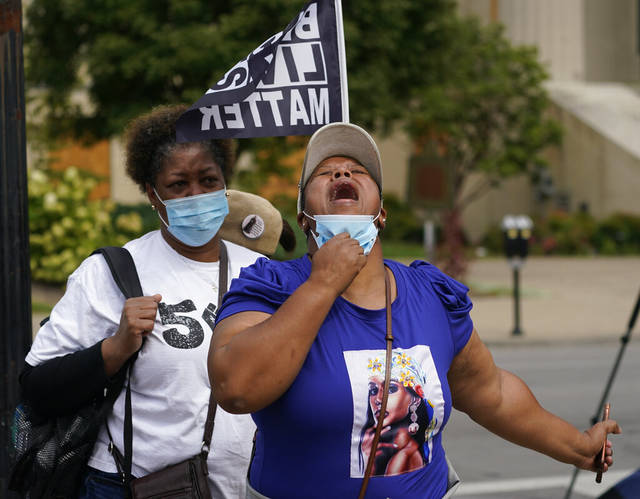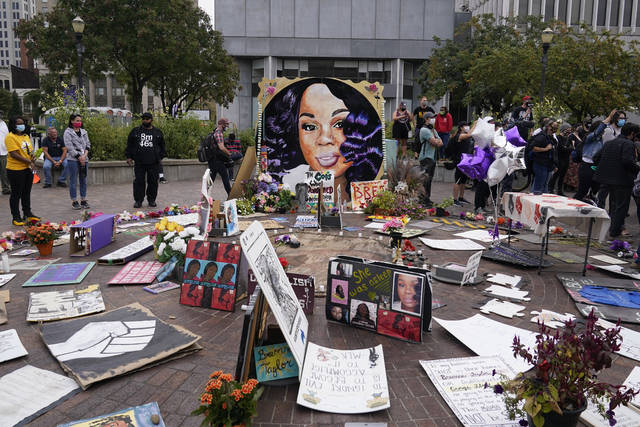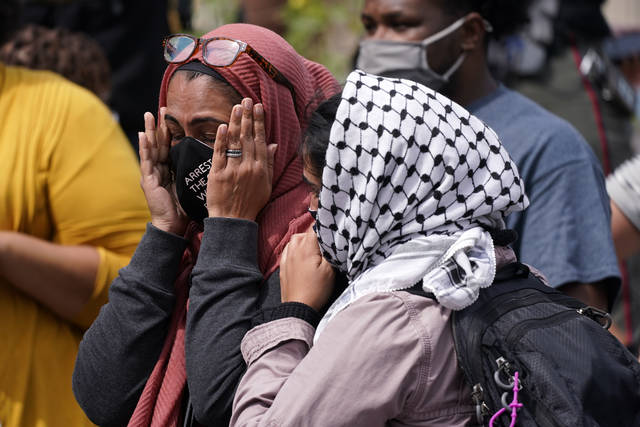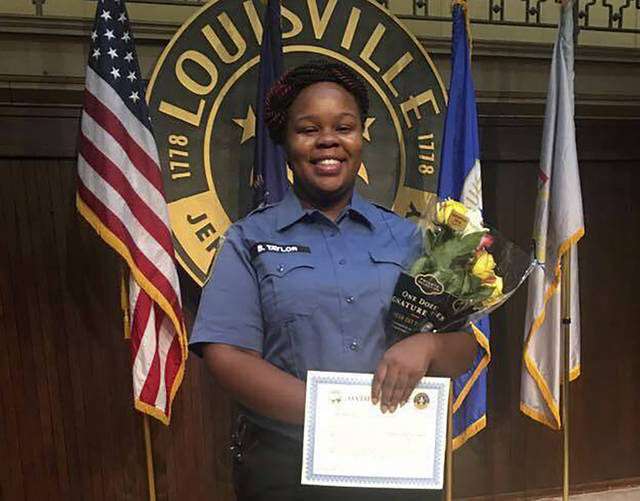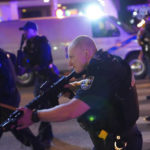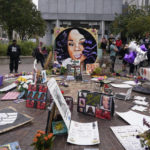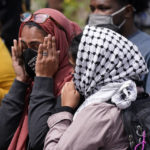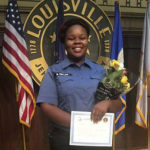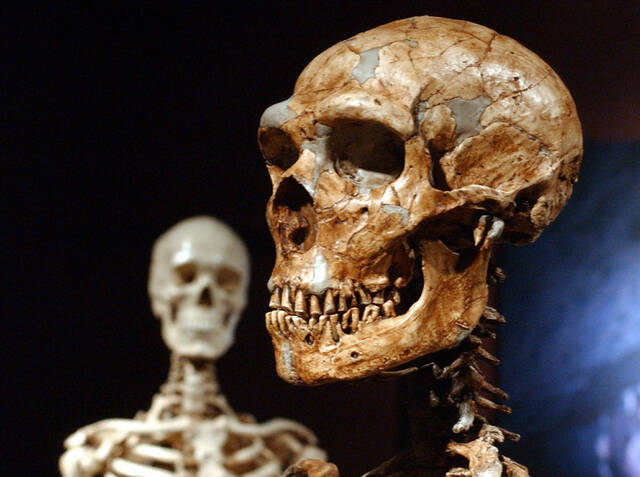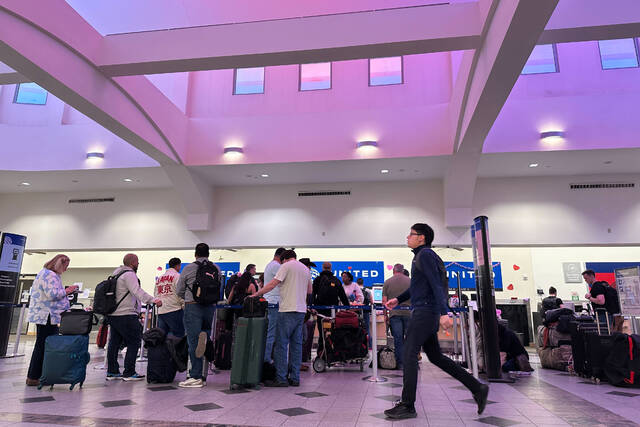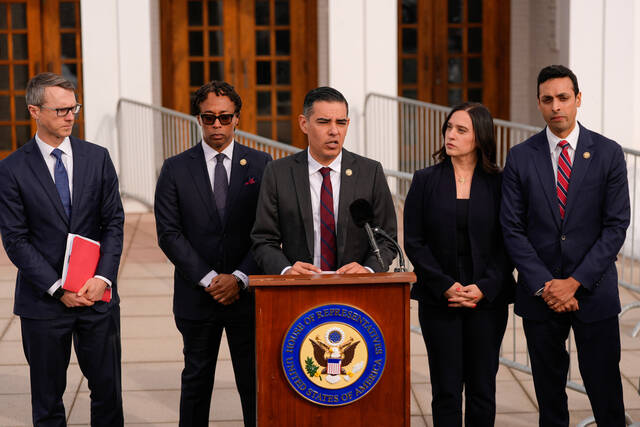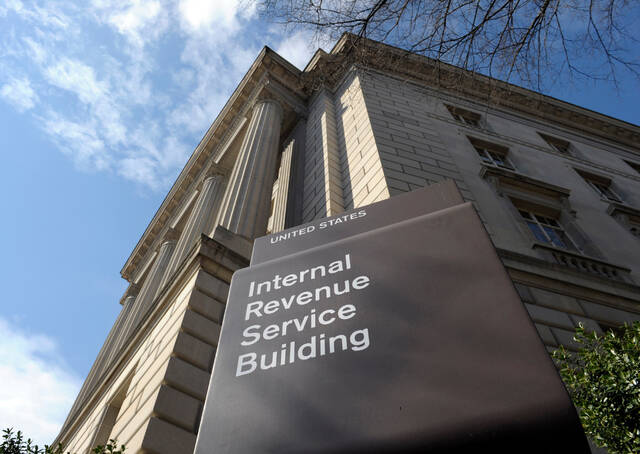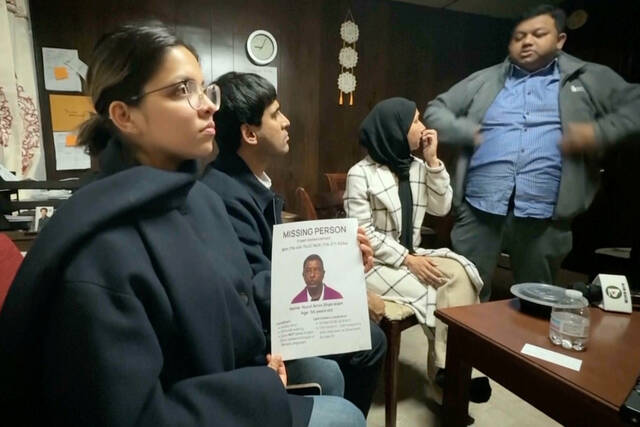LOUISVILLE, Ky. — A Kentucky grand jury brought no charges against Louisville police for the killing of Breonna Taylor during a drug raid gone wrong, with prosecutors saying Wednesday that two officers who fired their weapons at the Black woman were justified in using force to protect themselves after they were shot at.
The only charges brought by the grand jury were three counts of wanton endangerment against fired Officer Brett Hankison for shooting into Taylor’s neighbors’ homes during the raid on the night of March 13. The FBI is still investigating potential violations of federal law in the case.
Ben Crump, a lawyer for Taylor’s family, denounced the decision as “outrageous and offensive,” and protesters shouting, “No justice, no peace!” began marching through the streets. Some sat quietly and wept. Later, scuffles broke out between police and protesters, and some were arrested.
Taylor, an emergency medical worker, was shot multiple times by white officers who entered her home on a no-knock warrant during a narcotics investigation — although state Attorney General Daniel Cameron said Wednesday the investigation showed the officers did announce themselves before entering. The warrant used to search her home was connected to a suspect who did not live there, and no drugs were found inside.
Along with the killing of George Floyd in Minnesota, Taylor’s case became a major touchstone for the nationwide protests that have gripped the nation since May — drawing attention to entrenched racism and demanding police reform. Taylor’s image has been painted on streets, emblazoned on protest signs and silk-screened on T-shirts worn by celebrities. Several prominent African American celebrities have joined those urging that the officers be charged.
The announcement of the charges drew immediate sadness, frustration and anger that the grand jury did not go further. The wanton endangerment charges each carry a sentence of up to five years.
“To not indict the officers for murder is to claim #BreonnaTaylor killed herself. Racist America constantly kills Black people and then tells Black people we killed ourselves,” tweeted Ibram X. Kendi, director of the Center for Antiracist Research at Boston University and the author of “How to Be an Antiracist.”
Morgan Julianna Lee, a high school student in Charlotte, N.C., watched the announcement at home.
“It’s almost like a slap in the face,” the 15-year-old said by phone. “If I, as a Black woman, ever need justice, I will never get it.”
Right after the decision, protesters began gathering in Louisville, with some preparing food and others bringing cases of water to “Injustice Square,” the park where people have demanded justice for Taylor.
While the rallies were largely peaceful, police in protective gear carrying batons mobilized in downtown, and some scuffles broke out. Officers could be seen handcuffing some people. Police also ordered a group that broke off from the protests to disperse, warning that chemical agents might be used if they didn’t.
Gov. Andy Beshear, a Democrat, said he authorized a limited deployment of the National Guard. An Associated Press reporter saw guard members and armored military vehicles in downtown Louisville.
Beshear also urged Cameron, the state attorney general, to post online all the evidence that could be released without affecting the charges filed.
“Those that are currently feeling frustration, feeling hurt, they deserve to know more,” he said.
The case exposed the wide gulf between public opinion on justice for those who kill Black Americans, and the laws under which those officers are charged, which regularly favor working police and do not often result in steep criminal accusations.
At a news conference, Cameron spoke to that disconnect.
“Criminal law is not meant to respond to every sorrow and grief,” he said.
“But my heart breaks for the loss of Miss Taylor. … My mother, if something was to happen to me, would find it very hard,” he added, choking up.
But Cameron, who is the state’s first Black attorney general, said the officers acted in self-defense after Taylor’s boyfriend fired at them. He added that Hankison and the two other officers who entered Taylor’s apartment announced themselves before entering — and so did not execute the warrant as “no-knock,” according to the investigation. The use of no-knock warrants has since been banned by Louisville’s Metro Council.
“According to Kentucky law, the use of force by (Officers Jonathan) Mattingly and (Myles) Cosgrove was justified to protect themselves,” he said. “This justification bars us from pursuing criminal charges in Miss Breonna Taylor’s death.”
Cameron said an FBI crime lab determined that Cosgrove fired the bullet that killed Taylor.
Taylor’s boyfriend, Kenneth Walker, opened fire when police burst in, hitting Mattingly. Walker was charged with attempted murder of a police officer, but prosecutors later dropped the charge.
Walker told police he heard knocking but didn’t know who was coming into the home and fired in self-defense.
Cameron, who is a Republican, is a protégé of Senate Majority Leader Mitch McConnell who has been tagged by some as his heir apparent. His was also one of 20 names on President Donald Trump’s list to fill a future Supreme Court vacancy.
At a news conference, Trump read a statement from Cameron saying “justice is not often easy.” He praised both Cameron’s handling of the case and the governor’s calling up of the national guard.
Democratic presidential nominee Joe Biden told reporters Wednesday that he didn’t have enough information on the decision to comment fully but warned protesters to keep demonstrations peaceful.
“Do not sully her memory or her mother’s by engaging in any violence,” he said.
Kamala Harris, Biden’s running mate, also told reporters she also hadn’t fully read the decision.
“But there’s no question that Breonna Taylor and her family deserved justice yesterday, today and tomorrow, so I’ll review it,” she said.
Before charges were brought, Hankison was fired from the city’s police department on June 23. A termination letter sent to him by interim Louisville Police Chief Robert Schroeder said the white officer had violated procedures by showing “extreme indifference to the value of human life” when he “wantonly and blindly” fired his weapon.
Hankison had previously been placed on administrative reassignment, as were Mattingly, Cosgrove and the detective who sought the warrant, Joshua Jaynes.
On Sept. 15, the city settled a lawsuit against the three officers brought by Taylor’s mother, Tamika Palmer, agreeing to pay her $12 million and enact police reforms.
Here is a timeline of events that began with the death of Breonna Taylor, a Black woman whose killing by police in her home in Kentucky has encouraged a national reckoning on race:
• March 13: Officers serving a narcotics warrant fatally shoot Taylor in her home in Louisville, Kentucky.
• March 13, hours later: Police announce the arrest of Kenneth Walker in the wounding of an officer during an exchange of gunfire; Taylor is left unidentified at the news conference, described as “an unresponsive woman who was later pronounced dead.”
• March, April: The shooting stays out of the headlines as the covid-19 pandemic spreads in the U.S.
• April 27: Taylor’s family files wrongful death lawsuit against police department and city, challenging the police narrative.
• May 13: Top Louisville prosecutor Tom Wine recuses himself from reviewing police investigation, Attorney General Daniel Cameron named as special prosecutor.
• May 20: Chelsey Napper, Zayden Flournoy and Cody Etherton sue Officers Brett Hankison, Myles Cosgrove and Jonathan Mattingly, accusing them of disregarding human life by spraying gunfire into Napper’s apartment, next door to Taylor’s.
• May 22: Prosecutors announce they will drop attempted murder charges against Walker, who shot at officers in his girlfriend’s home.
• May 28: Walker’s anguished 911 call is released, three days after the death of George Floyd at the hands of police in Minnesota, sparking large protests in Louisville.
• May 29: Mayor Greg Fischer suspends use of no-knock warrants by Louisville police.
• June 1: Fischer fires Police Chief Steve Conrad after officers failed to turn on body cameras in shooting of barbecue cook David McAtee during protests in Louisville.
• June 11: Louisville Metro Council unanimously passes “Breonna’s Law” which bans use of no knock warrants.
• June 14: Pop star Beyoncé writes Attorney General Daniel Cameron, urging him to charge police officers.
• June 23: Officer Brett Hankison, one of 3 officers who fired shots the night of Taylor’s death, is fired for “blindly” firing into Taylor’s apartment.
• June 25: Celebrities join hundreds of demonstrators outside state Capitol calling on Cameron to charge officers.
• June 28: Photographer Tyler Gerth is fatally shot at site of ongoing protests in downtown Louisville.
• July 14: Protesters are arrested for demonstrating on Cameron’s front lawn.
• Aug. 12: Taylor’s mother, Tamika Palmer, meets with Cameron.
• Sept. 5: Hundreds peacefully protest outside Kentucky Derby, urging Cameron to criminally charge the officers.
• Sept. 7: Fischer names Yvette Gentry, first Black woman to lead Louisville Police department, as interim chief beginning Oct. 1.
• Sept. 9: Cameron is included on President Donald Trump’s shortlist of Supreme Court candidates.
• Sept. 15: City announces civil settlement providing Taylor’s family with $12 million and promising police reforms.
• Sept. 22: Louisville police set up blockades downtown in anticipation of Cameron’s announcement.
• Sept. 23: A Kentucky grand jury indicted Hankison for shooting into neighboring apartments, but did not charge any officers for their role in Taylor’s death.


